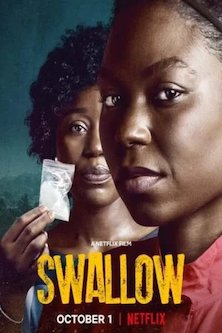Ordinary Nigerian life takes center stage in Swallow, Kunle Afolayan’s 2021 adaptation of Sefi Atta’s novel of the same name. It is 1980s Lagos. Tolani Ajao leads such a life as a bank secretary, with her spirited friend, roommate and colleague Rose, and her boyfriend Sanwo, who is without work and reluctant to commit to marriage despite their three-year relationship. Unfortunately, ordinary includes the bank manager’s constant sexual advances on Rose. She is fired when, frustrated, she slaps him. He then requests Tolani as his new personal secretary, and begins harassing her as well.
Unemployed and indignant, Rose enters a relationship with O.C. whom she figures can take care of her financially. Later she learns he is a smuggler, and he recruits her as a drug mule. Tolani is appalled by this, but in their new circumstance, she considers Rose’s offer to join her in smuggling drugs to London, yet remains conflicted between the generous compensation and her values.
However, singer-songwriter Niyola’s lackluster performance as Tolani gives no room for this inner turmoil. “I have suffered,” she tells her mother when she returns to Makoku. “I have been through so much.” It is hard to root for Niyola’s Tolani amidst her troubles. Her mounting frustration is unconvincing—when she confronts her coworkers at the food stand, her outburst seems like it comes out of nowhere—and so is her relationship with Deyemi Okanlawon’s Sanwo, with whom she has a flat dynamic. Tolani is without emotional resonance, and the flashbacks to moments with her parents do not suffice in fleshing her out. Niyola cannot get you to care enough.
It is Ijeoma Grace Agu who steals attention as world-weary Rose. And while that has a lot to do with the character’s scripted spunk, Agu adds a vulnerability that gleams onscreen. Rose is desperate and scared, but the way her fear translates into grit makes her interesting to watch. “Nothing will change until you and I change it,” she tells Tolani, and she is resolute in not accepting her fate. While her desire to survive leads her to do questionable things, she is unperturbed. “You know what shames me?” she asks. “Poverty. And it should shame you too.”
Beautifully shot with a retro aesthetic, Afolayan’s portrayal of ‘80s Lagos is painstaking, complete with details of the time. For the better part of the film, his directing delays the conflict and instead opts for a detailing of their lives, and as a result, the story ambles. The slow pace immerses us in the world of these women, their own relationship as roommates and friends, their commute to work in a bustling, growing city, their interaction with neighbours and coworkers, everyday life before it is disrupted.
Swallow does not let itself be anything more than its source material, and still, the depth of Atta’s novel evades this adaptation. But it does succeed in portraying the very human theme of resilience, and questions of morality, of right and wrong. It is a Nigeria rife with socio-economic problems. It is also a deeply patriarchal society. These women will go to lengths to survive. But how far is far enough? ♦


